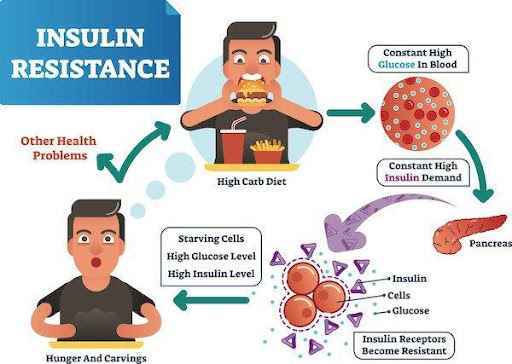Hyperinsulinemia: A Consequence of Insulin Resistance

“Insulin is a hormone made by the pancreas that helps glucose in your blood enter cells in your muscle, fat, and liver, where it’s used for energy.” (1)
Insulin is produced by the pancreas, an organ with two essential functions:
- Digestive function – the pancreas releases “pancreatic juice” which is a fluid filled with enzymes used to break down the foods we eat into their constituent parts: proteins, fats, and carbohydrates to be used in the body.
- Endocrine function – regulation of blood sugar (blood glucose) levels by secreting the following hormones: insulin, glucagon, somatostatin, and pancreatic polypeptide.
Today, we will focus on insulin.
Beta cells in the pancreas release the insulin. (2)
These beta cells check your blood sugar level every couple of seconds! It is constantly being monitored. The pancreas is always ready to secrete insulin to keep blood glucose levels in an ideal range. (2)
Refined carbohydrates convert almost immediately to sugar (starting in our mouth) which creates a rapid rise in blood sugar levels which leads to a rapid rise of insulin. The body does not need any more than 1 teaspoon of sugar in its bloodstream at any given moment and anything in excess must be dealt with quickly.
A rise in blood sugar levels, triggers the pancreas to secrete insulin, which signals cells to uptake the excess glucose. This can lead to a drop in blood sugar levels which can lead to a condition called hypoglycemia (aka blood sugar crash) which can cause sugar cravings. This can lead to more sugar consumption, more insulin, more crashes and more cravings. A vicious cycle.
With consistent refined carbohydrate consumption, the pancreas is continuously secreting insulin and cells are continuously up taking sugar. The cells are agreeable until they start bursting at the seams and risk cell death. At this point, cells ignore the demands of insulin. This is called insulin resistance.
Insulin resistance provokes the pancreas to pump out even more insulin. This leads to a condition called Hyperinsulinemia (high levels of insulin) which is directly tied to diabetes, obesity and cancer (among other health conditions).
Now, we are in a world of trouble. High levels of insulin and high levels of blood sugar are a deadly duo.
High blood sugars damage our arteries and circulatory system (among other issues) and high insulin prevents fat burning, promotes fat storage and increases our hunger because the cells become energy deficient. High insulin levels directly cause weight gain and fatigue. Eventually, it also leads to pancreatic burnout. The pancreas can no longer produce enough insulin to regulate blood glucose. This leads doctors to prescribe insulin via injections to manage high blood sugar levels (Diabetes). But this still leaves us in a state of high insulin if we don’t change our diet. Taking insulin externally does not negate the negative impacts of blood sugar and insulin spikes throughout the day.
It is so sad that we do this to our bodies.
Eating refined carbs (sugar) – especially in excess – is traumatic to the body. It deprives it of the nutrition it needs to function optimally. It damages its organs, creates systemic malfunction, and produces oxidative stress. And that is just the tip of the iceberg.
And here we are obsessed about being deprived of our ‘sweet treat’. Like we are the ones being hard done by! We got this backwards.
—Florence

SOURCES:
- https://www.niddk.nih.gov/health-information/diabetes/overview/what-is-diabetes/prediabetes-insulin-resistance
- https://www.webmd.com/diabetes/glucose-diabetes
- https://www.nature.com/scitable/topicpage/dynamic-adaptation-of-nutrient-utilization-in-humans-14232807/
- https://ithrive.health/lose-weight/ (IMAGE)
Join Our Sugar-Free Tribe!
Sign up now to get the latest news, updates, and information about Sugar Detox and Sugar Addiction.
0 comments
Leave a comment